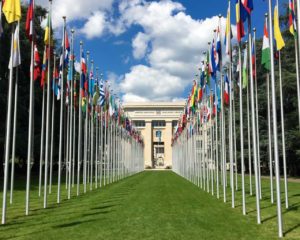By: Faiza Chappell
Starting the week of October 15, 2018, the Fourth Session of the Open-Ended Intergovernmental Working Group (hereinafter “OEIGWG”) on transnational corporations and other business enterprises with respect to human rights of the United Nations Human Rights Council will take place at the United Nations (“U.N.”) headquarters in Geneva, Switzerland.[1] The OEIGWG introduced draft text of a treaty for the High Commissioner of Human Rights[2] this past July, which will function as the foundation for the negotiations at the upcoming Fourth Session.[3] Furthermore, world leaders will gather to negotiate the creation of international human rights law to guarantee that businesses respect human rights in their operations.[4]
The U.N. continues to take substantial steps to ensure governments and businesses respect human rights in global business operations.[5] In 2011, the U.N. Office of the High Commissioner for Human Rights (“OHCHR”) published a report, the Guiding Principles on Business and Human Rights (“Guiding Principles”). The Guiding Principles defined the responsibilities for the governments of states where the business is operating, and the responsibilities of the businesses themselves through: (1) states duties to protect; (2) corporate responsibilities to respect; and (3) access to remedies.[6] However, even with such an extensive report and detailed guidance, many governments and businesses continue to struggle with compliance.[7]
Leading up to the negotiations in the Fourth Session this week, the biggest challenge is garnering support from large political players such as the United States and the European Union.[8] Western businesses committed themselves to respecting human rights and protecting workers who experienced human rights violations as result of corporate abuses; however, noncompliance and corporate abuses are still very much alive today.[9] From the EU’s standpoint, many European governments are in favor of granting businesses broad discretion on which human rights rules and laws to follow as a means to protect the competitiveness of European companies.[10] On the contrary, many human rights defenders argue that such an approach will enable corruption in the future, thus leading to more human rights violations and less remedies or options for workers to freely exercise without backlash or repercussions.[11] In all, many of the larger states disagree with the international community and with the U.N. creating binding laws with respect to global business operations, even if it means protecting the workers and their human rights. On the other hand, some states, as well as human rights defenders, disagree with the lack of regulation for global business operations, given the impact it could have on the protection of human rights.[12]
Businesses face many opened-ended questions, and several uncertainties going into this week’s negotiations. In the discussions of creating new international law with regards to business and human rights, many businesses operating transnationally may be affected if certain signatory states to the treaty are obligated by treaty to enact legislation that requires businesses to conduct “human rights due diligence” or to “provide legal recourse.”[13] A potential issue may arise when businesses in signatory states engage in transnational business operations with businesses in non-signatory states of a potential treaty. I look forward to seeing whether businesses will be open to the international community’s suggestion for creating binding law or if businesses will push back and continue to fight for their autonomy on the global stage.
[1] Fourth Session of the Open-Ended Intergovernmental Working Group on Transnational Corporations and Other Business Enterprises with Respect to Human Rights, U.N. Hum. Rts. Council, https://www.ohchr.org/EN/HRBodies/HRC/WGTransCorp/Session4/Pages/Session4.aspx (last visited Oct. 16, 2018).
[2] Christopher Walter & Hannah Edmonds, A Step Along the Road to a Legally Binding Treaty on Business and Human Rights, Nat’l L. Rev. (Aug. 22, 2018), https://www.natlawreview.com/article/step-along-road-to-legally-binding-treaty-business-and-human-rights.
[3] Walter & Edmonds, supra note 2.
[4] Neelanjana Mukhania & Paul de Clerck, European Governments are Protecting Big Business Over Victims of Human Rights Abuses, Euronews (Oct. 9, 2018), https://www.euronews.com/2018/10/09/european-governments-are-protecting-big-business-over-victims-of-human-rights-abuses-view.
[5] United Nations Human Rights Council, supra note 1.
[6] U.N. Hum. Rts. Off. of the High Comm’r, Guiding Principles on Business and Human Rights, at 1, U.N. Doc. HR/PUB/11/04 (2011).
[7] Mukhania & Clerck, supra note 4 (“[T]he expansion of unregulated international trade and globalization encouraged the emergence of global ‘value chains’ dominated by very large companies, built on the use of a cheap and unorganized labor workforce in the Global South. This model whereby women are concentrated in the lowest paid and insecure jobs has made jobs dependent on a few, super-powerful economic actors and devastated countless micro, small and medium size enterprises in Europe, who can’t compete with low labor standards prevailing in many countries.”).
[8] See generally Mukhania & Clerck, supra note 4; Amy Lehr, Fighting for Human Rights Makes Both Moral and Business Sense, The Hill (Oct. 3, 2018), https://thehill.com/opinion/international/409633-fighting-for-human-rights-makes-both-moral-and-business-sense.
[9] Mukhania & Clerck, supra note 4.
[10] Id.
[11] Lehr, supra note 8; Caroline Rees, We Need Better Tools to Evaluate How Well Business Respects Human Rights, Ethical Corp. (Oct. 4, 2018), https://www.ethicalcorp.com/we-need-better-tools-evaluate-how-well-business-respects-human-rights.
[12] See generally Rees, supra note 11.
[13] Walter & Edmonds, supra note 2.


